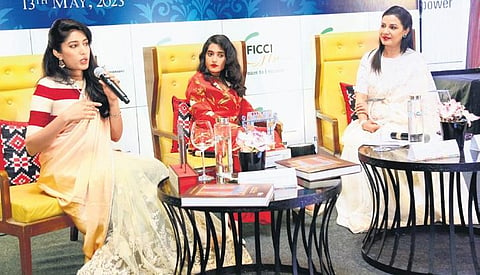

HYDERABAD: Flo, the women’s wing of the Federation of Indian Chamber of Commerce & Industry (FICCI), invited princesses-turned-entrepreneurs Mrinalika and Akshita to share their success stories with their members recently. The sisters are the 48th generation of the royal Bhanjdeo family of Mayurbhanj, Odisha. They have restored their age-old residential palace and converted it into a boutique hotel while centring local communities and the heritage of the tribal-dominated area.
Sharing their experiences of growing up with the ‘princesses’ tag, they said it was not easy to understand and live up to the title, especially when you are a royal who has accepted democracy. They studied in Singapore and the US before coming back to India and taking up the herculean task of restoring their palace. Highlighting the fact that they had to encounter misogyny and vindication at every step, they shared that it was also a meditative experience.
Built-in Victorian architecture style with elements of Art Deco work, the Belgadia palace was a treasure trove for sisters who took care of each and every detail while restoring it. The idea of sustainability was at the forefront of the restoration work, keeping in mind that they want to give back to the communities that served them for generations.
“We define sustainability through three pillars: social, economic and environmental,” said Mrinalika. “For social and economic aspects, we tie up with different handicraft clusters in the villages around Baripada. We take our guests there to showcase handicrafts and engage with the artists on a personal level,” she added.
She emphasised that on a regular shopping trip, customers are disconnected and detached from the story of the artisan. “When we take our guests to handicraft clusters like Dokhra, which is a traditional metal crafting technique or sabai grass which can be woven into tablemats, coasters, etc. They are 100 per cent biodegradable products. We don’t force our guests to buy anything. One of our employees escorts the guests to these places and they see these arts in their raw forms,” she said, adding that this not only takes care of the sustainability aspect but also establishes a direct connection between the artmaker and the consumer. “We are also highlighting a dying art and cultural form of Mayurbhanj,” she further added.
Akshita pitched in with her insights into the same: “Every business leaves a carbon footprint and there are ways to calculate it. It is important to understand as individuals and organisations whether it’s working with or against nature. The first thing in India, we have step wells and all. The idea of whatever is coming to us with nature, how being able to use that and catalyse our enterprise to give back to the community, as soon as what you’re doing is causing a drain on the community around you, that’s when there’s gonna be a kickoff. We realised that when we say we’re sustainable, I just want to make sure what we mean by our journey towards sustainability. For example, when we were doing the restoration process, we tried to make sure we hire an architect where whatever was already there was preserved. We didn’t buy any new things unless there were fixtures, so needed to be updated to make, and amend the cost,” she said.
On being asked what they think of the growth of the hospitality industry, Akshita mentioned, “At least in India, it has been on the rise. For the past two years, it had been impacted deeply due to the pandemic. From the perspective of the international client, there are so many motels in India, in Rajasthan, Gujarat, North and North East that thrive on the international clients. With that being taken away, they had to restructure their models after the pandemic. But for us, we opened just six months before the pandemic and always had the domestic traveller in mind. When revenge travel happened, we benefited from it. We are not going to rise in the international market for about another two years. With roads and highways, we attract guests as much as we can.”
Akshita shared some insights for other entrepreneurs as well. Based on her own experience, she said that every business has its own strengths and for them, it is the community. It is through the shared livelihoods based around the artisanal community that they are able to succeed. Secondly, they focus on providing customers with an experience rather than a product. Lastly, she said one should be aware of the emerging trends in the industry. “We know that AI technology is coming. All we need to do is learn and understand the language of the technology, learn how to access the data and the rest will fall in place,” she said.